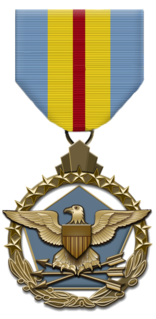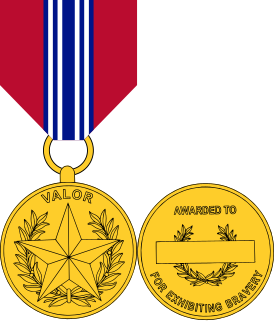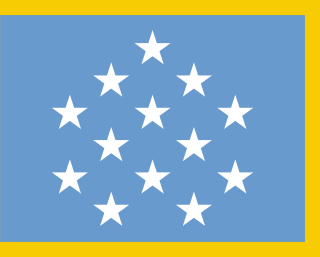Related Research Articles
The Bronze Star Medal (BSM) is a United States Armed Forces decoration awarded to members of the United States Armed Forces for either heroic achievement, heroic service, meritorious achievement, or meritorious service in a combat zone.

"Don't ask, don't tell" (DADT) was the official United States policy on military service of non-heterosexual people, instituted during the Clinton administration. The policy was issued under Department of Defense Directive 1304.26 on December 21, 1993, and was in effect from February 28, 1994, until September 20, 2011. The policy prohibited military personnel from discriminating against or harassing closeted homosexual or bisexual service members or applicants, while barring openly gay, lesbian, or bisexual persons from military service. This relaxation of legal restrictions on service by gays and lesbians in the armed forces was mandated by Public Law 103–160, which was signed November 30, 1993. The policy prohibited people who "demonstrate a propensity or intent to engage in homosexual acts" from serving in the armed forces of the United States, because their presence "would create an unacceptable risk to the high standards of morale, good order and discipline, and unit cohesion that are the essence of military capability".

The Defense Distinguished Service Medal is a military decoration of the United States Department of Defense, which is presented to United States Armed Forces servicemembers for exceptionally distinguished performance of duty contributing to the national security or defense of the United States. The medal was created on July 9, 1970, by President Richard Nixon in Executive Order 11545. President Nixon awarded the first medal, on the day the Executive Order was signed, to General Earle Wheeler, who was retiring from the US Army after serving as Chief of Staff of the United States Army and then Chairman of the Joint Chiefs of Staff.
The Presidential Medal of Freedom is an award bestowed by the president of the United States to recognize people who have made "an especially meritorious contribution to the security or national interests of the United States, world peace, cultural or other significant public or private endeavors." The Presidential Medal of Freedom and the Congressional Gold Medal are the highest civilian awards of the United States. The award is not limited to U.S. citizens and, while it is a civilian award, it can also be awarded to military personnel and worn on the uniform. It was established in 1963 by President John F. Kennedy, superseding the Medal of Freedom that was established by President Harry S. Truman in 1945 to honor civilian service during World War II.

The Silver Star Medal (SSM) is the United States Armed Forces' third-highest military decoration for valor in combat. The Silver Star Medal is awarded primarily to members of the United States Armed Forces for gallantry in action against an enemy of the United States.

The United States secretary of defense (SecDef) is the head of the United States Department of Defense, the executive department of the U.S. Armed Forces, and is a high ranking member of the federal cabinet. The secretary of defense's position of command and authority over the military is second only to that of the president of the United States, who is the commander-in-chief. This position corresponds to what is generally known as a defense minister in many other countries. The secretary of defense is appointed by the president with the advice and consent of the Senate, and is by custom a member of the Cabinet and by law a member of the National Security Council.

The Prisoner of War Medal is a military award of the United States Armed Forces which was authorized by Congress and signed into law by President Ronald Reagan on 8 November 1985. The United States Code citation for the POW Medal statute is 10 U.S.C. § 1128.

The Distinguished Service Cross (DSC) is the United States Army's second highest military decoration for soldiers who display extraordinary heroism in combat with an armed enemy force. Actions that merit the Distinguished Service Cross must be of such a high degree that they are above those required for all other U.S. combat decorations, but which do not meet the criteria for the Medal of Honor. The Army Distinguished Service Cross is equivalent to the Navy and Marine Corps' Navy Cross, the Air Force and Space Force's Air Force Cross, and the Coast Guard Cross. Prior to the creation of the Air Force Cross in 1960, airmen were awarded the Distinguished Service Cross.

The Soldier's Medal is an individual decoration of the United States Army. It was introduced as Section 11 of the Air Corps Act, passed by the Congress of the United States on July 2, 1926. The Army' Soldier's Medal is equivalent to the Navy and Marine Corps Medal, the Air Force and Space Force's Airman's Medal, and the Coast Guard Medal. Prior to the creation of the Airman's Medal in 1960, airmen were awarded the Soldier's Medal.
A "V" device is a metal 1⁄4-inch (6.4 mm) capital letter "V" with serifs which, when worn on certain decorations awarded by the United States Armed Forces, distinguishes an award for heroism or valor in combat instead of for meritorious service or achievement.
The United States Armed Forces authorize certain medal and ribbon devices that may be worn if authorized on a defined set of United States military decorations and awards. The devices vary between 3⁄16 inch to 13⁄32 inch in size and are usually attached to suspension and service ribbons of medals and to unit award ribbons. The devices are usually made of brass or metal alloys that appear gold, silver, or bronze in color with either a dull or polished look. The devices may denote additional awards of the same decoration or award, an award for valor or meritorious combat service, participation in a particular campaign, periods of honorable service, specific events, and other special meanings. These are sometimes referred to as award devices, but are most commonly referred to in service regulations and Department of Defense instructions simply as "devices" for awards and decorations.

The Stolen Valor Act of 2005, signed into law by President George W. Bush on December 20, 2006, was a U.S. law that broadened the provisions of previous U.S. law addressing the unauthorized wear, manufacture, or sale of any military decorations and medals. The law made it a federal misdemeanor to falsely represent oneself as having received any U.S. military decoration or medal. If convicted, defendants might have been imprisoned for up to six months, unless the decoration lied about is the Medal of Honor, in which case imprisonment could have been up to one year. In United States v. Alvarez (2012), the Supreme Court of the United States ruled that the Stolen Valor Act of 2005 was an unconstitutional abridgment of the freedom of speech under the First Amendment–striking down the law in a 6 to 3 decision.

The Homeland Security Distinguished Service Medal is a military decoration of the Department of Homeland Security, which is presented to United States Armed Forces servicemembers for exceptionally meritorious service. The current version of the medal was established in February 2003, retroactive to March 1, 2002.

The Secretary of the Army Award for Valor was established 15 April 2002, to acknowledge acts of heroism or bravery connected with an Army employee or Army activity, or that in some way benefits the Army. The performance of the act must be evidenced by voluntary action above and beyond the call of duty. The equivalent military decoration for this award is the Soldier's Medal.

The Office of the Secretary of the Defense Medal for Valor is the highest civilian award for valor presented by the United States Department of Defense. Created in 2001 in the aftermath of the September 11 attacks, the medal recognizes government employees and private citizens who perform an act of heroism or sacrifice, with voluntary risk to their personal safety in the face of danger.
United States v. Alvarez, 567 U.S. 709 (2012), is a landmark decision in which the Supreme Court of the United States ruled that the Stolen Valor Act of 2005 was unconstitutional. The Stolen Valor Act of 2005 was a federal law that criminalized false statements about having a military medal. It had been passed by Congress as an effort to stem instances where people falsely claimed to have earned the medal in an attempt to protect the valor of legitimate recipients. A 6–3 majority of the Supreme Court agreed that the law was unconstitutional and violated the free speech protections under the First Amendment. Despite reaffirming the opinion that was previously issued by the Ninth Circuit, it could not agree on a single rationale. Four justices concluded that a statement's falsity is not enough, by itself, to exclude speech from First Amendment protection. Another two justices concluded that while false statements were entitled to some protection, the Stolen Valor Act of 2005 was invalid because it could have achieved its objectives in less restrictive ways.

Hollister K. Petraeus is a retired Assistant Director at the Consumer Financial Protection Bureau (CFPB), where she headed up the Office of Servicemember Affairs. She retired on January 12, 2017. Her work at the CFPB centered around educating service members on sound financial management and protecting them against predatory lending and cons. She is the wife of retired General David Howell Petraeus.

The Distinguished Warfare Medal was a planned United States military decoration announced by former U.S. Secretary of Defense Leon Panetta on 13 February 2013. It would have been the first U.S. combat-related award to be created since the Bronze Star Medal in 1944. The blue, red and white-ribboned medal was to be awarded to individuals for "extraordinary achievement" related to a military operation occurring after 11 September 2001. It was intended to recognize military achievement in cyberwarfare or combat drone operations for actions that did not include valor in combat.

The Stolen Valor Act of 2013 is a United States federal law that was passed by the 113th United States Congress. The law amends the federal criminal code to make it a crime for a person to fraudulently claim having received a valor award specified in the Act, with the intention of obtaining money, property, or other tangible benefit by convincing another that he or she received the award.

The Medal of Honor (MOH) is the United States Armed Forces' highest military decoration and is awarded to recognize American soldiers, sailors, marines, airmen, guardians and coast guardsmen who have distinguished themselves by acts of valor. The medal is normally awarded by the president of the United States, but as it is presented "in the name of the United States Congress", it is sometimes erroneously referred to as the "Congressional Medal of Honor".
References
- ↑ Awards and Decorations Statistics by Conflict, Washington, D.C.: United States Army, 29 June 2012, retrieved 25 July 2012
- ↑ Munoz, Carlo (25 July 2012), "DoD unveils 'Stolen Valor' database", The Hill , Washington, D.C. , retrieved 25 July 2012
- 1 2 Tapper, Jake (23 July 2012), Fighting 'Stolen Valor,' President Obama Announces New Website to Combat Those Falsely Claiming Military Medals, New York City, New York: ABC News , retrieved 25 July 2012
- ↑ Knox, Oliver (24 July 2012), Stolen valor: Obama vows to fight 'contemptible' lies with website, Washington, D.C.: Yahoo! News , retrieved 25 July 2012
- 1 2 Garamone, Jim (25 July 2012), New Website Honors Service Members' Valor, Washington, D.C.: American Forces Press Service, retrieved 25 July 2012
- ↑ valor.defense.gov, Washington D.C.: U.S. Department of Defense, 25 July 2012, retrieved 25 July 2012
- 1 2 Shane, Leo; Carroll, Chris (23 July 2012), DOD will unveil website to combat stolen valor this week, Washington, D.C.: Stars and Stripes , retrieved 25 July 2012